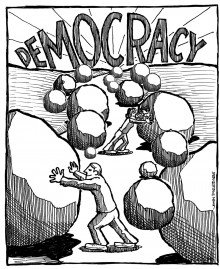1) Representative Democracy is not really democracy
A system whereby small numbers of people, in our case MPs, govern many millions of others, is not democratic. The extent of our self-government is a mere cross in a box every four or five years.
Sometimes as many people do not vote at all as vote for the party which ends up in power. Usually more people don’t vote for the party that gets in than do. For example in 2010 while over 10 million voted for the Conversatives, over 15 million voted for other parties. Furthermore, 35% of those eligible to vote simply didn’t. From this we can surmise that in fact a minority of people in the UK actively wanted to be governed by the Conservatives.
2) A two-party system is not democracy
That mere cross in a box has for the best part of the last century led to the election of one of two main parties, Labour and Tory, who were traditionally seen as broadly left-wing and broadly right-wing. For starters, a simple polarised choice is hardly democratic in itself, but once we pick apart the system things get even worse…
3) Representation in the interests of the rich is not democracy
In a democracy decisions are made in the interests of the people. At the very least the majority of the people. In the UK it is evident that decisions are generally made in the interests of a small number of people, namely the rich. Taxes are cut for the highest earners and large corporations are able to evade billions of tax while the poorest see their benefits slashed and are forced to work for little or even no pay.
4) Representation largely by the rich is not democracy
Those in government are mostly very wealthy themselves, so it comes as no surprise that they would represent their own interests and those of their class. Around two thirds of the cabinet and the House of Commons are millionaires, compared to a tiny proportion in the general population.
5) Capitalism and the profit motive is not compatible with real democracy
In light of all this, it’s worth considering whether capitalism is even compatible with democracy. The highest goal and driving force of capitalism is profit, regardless (or perhaps in spite of) any other associated notions of freedom or democracy. Time and again capitalists have subverted even our false democracy in order to protect their profits and interests. Government ministers and MPs are often friends or relatives of prominent capitalists, and many have financial interests that run counter to the interests of the majority of people. As an example, the unelected Lord Browne, with financial interests in fracking, is at the very heart of government policy and decision-making on the issue.
6) Having a choice between Capitalist parties is no real choice
The current political parties offer the people ‘Hobson’s Choice’. Hobson was a stable owner who would offer his customers the horse nearest the door only, or none at all. You can put your cross in a box on May 5th by all means, but whoever you vote for will be a capitalist party. Even Labour, seen as a party of the left, have for the last few decades slid further and further to the right, to the extent that they are now undoubtedly a capitalist centre-right party. I cannot say with any certainty who will be elected in 2015, but I could say with absolute certainty they’ll be a capitalist party.
7) Trade agreements like the TTIP are not democratic
Trade agreements such as the ‘TTIP’ (Trans-Atlantic Trade and Investment Partnership) which allow corporations to sue governments for a loss in profits resulting from legislation are fundamentally anti-democratic. The government is supposed to represent the people (ignoring for a minute the fact that it doesn’t), and if for example a law is passed that prohibits a company from dumping toxic waste, which results in a loss of profits, that company could sue the government, and in fact the people!
8) What about referendums?
Even within a rather crappy representative democracy such as ours, there still exists the opportunity for referendums, where all those eligible to vote get to decide on a important issue. These are however very rarely seen. Perhaps they are just too democratic, and may yield results that go against the ‘Westminster Consensus’ of free market capitalism? When we have seen referendums, such as recently on the issue of Scottish Independence, those in power tend to work together with the rich and the media to get the result they want.
Beau Nafyde








This sight is really helpful thank you so much